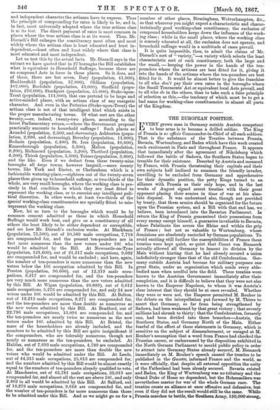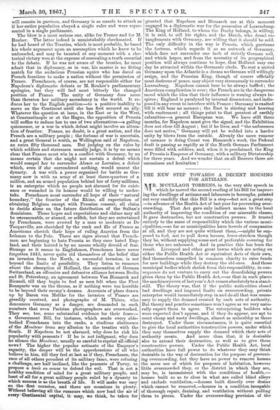THE EUROPEAN POSITION. E VERY grown man in Germany outside Austria
competent, to bear arms is to become a drilled soldier. The King of Prussia is ex officio Commander-in-Chief of all such soldiers. That is the substance of the Treaties between Prussia, Bavaria, Wurtemburg, and Baden which have this week created such excitement in Paris and throughout France. It appears that immediately after the agreement of Nikolsburg which followed the battle of Sadowa, the Southern States began to- tremble for their existence. Deserted by Austria and menaced by France, with Prussia threatening their capitals and their own subjects half inclined to summon the friendly invader, unwilling to be excluded from Germany and apprehensive for their dynastic position, the petty Kings turned to an alliance with Prussia as their only hope, and in the last weeks of August signed secret treaties with their great opponent placing their armies in time of war at his abso- lute disposal. It was understood also, though not provided by treaty, that these armies should be organized for the future upon the Prussian system, and a Bill with that end has, we , believe, been introduced into the Bavarian Parliament. In return the King of Prussia guaranteed their possessions from every enemy except himself, a guarantee invaluable to Bavaria, whose Palatinate lies across the Rhine and within the grip of France ; but not so valuable to Wurtemburg, whose dominions are absolutely encircled by German populations. To- avoid exciting still further the susceptibilities of France these treaties were kept quiet, so quiet that Count von Bismarck actually allowed all Germany to lament its division by the- Main without hinting that he had already secured a union indefinitely stronger than that of the old Confederation. Ger- many outside Austria- had become for military purposes one- great State, under an organization which sends every able- bodied man when needful into the field. These treaties-were- known to the Austrian Government immediately after their completion, and it is difficult to believe that they were not also- known to the Emperor Napoleon, to whom it was Austria's clear interest that they should be at once revealed. Whether- they were or were not, the Emperor permitted M. Ronher in the debate on the interpellation put forward by M. Thiers to, assert that Germany, so far from being strengthened by Sadowa, had been weakened by that great victory ; that seventy millions had shrunk to thirty; that the Confederation, formerly one, had been divided into three branches—Austria, the- Southern States, and Germany North of the Main. Either fearful of the effect of these statements in Germany, which is sensitive on the subject of dismemberment, or enraged at At Ronher's assumption that a word from France had checked the- Prussian career, or embarrassed by the disposition exhibited in. the North German Parliament to mould public policy in order to attract into Germany States already secured, M. Bismarck immediately on M. Rouher's speech caused the treaties to be published in the Gazette, informed France and the world, w- it were officially, that despite all external opposition the unity of the Fatherland had been already secured. Bavaria existed and Baden, the King of Wurtemburg was no tributary and the Grand Duke of Hesse no dependent, but the Hohenzollern,was nevertheless master for war of the whole German race. The- treaties create an alliance at once offensive and defensive; but even if they did not the result would still be the same. While Prussia marches to battle, the Southern Army, 150,000 strong„
-will remain in garrison, and Germany is as unsafe to attack as if her entire population obeyed a single ruler and were repre- sented in a single parliament.
The blow is a most serious one, alike for France and for M. Rouher. The latter indeed is unmistakably checkmated. If he had heard of the Treaties, which is most probable, he based his whole argument upon an assumption which he knew to be unfounded, and may be taunted at any moment with a rhe- torical victory won at the expense of concealing a truth essential to the debate. If he was not aware of the treaties, he must admit that in diplomacy, as in war, his master is no fitting match for the audacious Prussian squire who has dared on French frontiers to make a nation without the permission of France. Frenchmen, of course, are not responsible either for Napoleon's diplomatic defeats or M. Rouher s parliamentary apologies, but they -will feel most bitterly the changed position of France. The unity of Germany does more than threaten her military ascendancy in the world. It re- duces her to the English position—to a positive inability to move on -the Continent until she has first secured an ally. Whatever the question at issue, in the East or in the West, at Constantinople or at the Hague, the opposition of Prussia will suffice to reduce her to one of two alternatives—a galling quiescence, or a war in which defeat might involve an altera- tion of frontier. France, no doubt, is a great nation, and the French are a military people ; the fortune of war is uncertain, and a great General is worth, as Wellington said of Napoleon, an extra fifty thousand men. But judging on the rules by which soldiers and statesmen usually judge, it is by no means clear that France must win in a conffict with Germany, by no means certain that she might not sustain a defeat which would compel her to surrender Alsace or Lorraine, a defeat Which, even if she surrendered nothing, would unseat the dynasty. A war with a power organized for battle as Ger- many now is with an army of at least three-quarters of a million, and an. armed population behind her of forty millions, is an enterprise which no people not alarmed for its exist- ence or wounded in its honour would be willing to under- take. Frenchmen must surrender all hope of their "natural boundary," the frontier of the Rhine, all expectation of obtaining Belgium except with Prussian consent, all claim to decide alone on the future distribution of the Sultan's dominions. Those hopes and expectations and claims may all be mIreasonable, or absurd, or selfish, but they are entertained by Frenchmen, were avowed by a man so moderate as De Tocqueville, are cherished by the rank and file of France as Americans cherish their hope of ruling America from the Isthmus to the Pole. There are signs abroad that French- men are beginning to hate Prussia as they once hated Eng- land, and their hatred is by no means wholly devoid of fear. Strange as it seems to Englishmen, Frenchmen have never forgotten 1815, never quite rid themselves of the belief that an invasion from the North, a successful invasion, is not beyond the limits of possibility. They listen to rumours about the absorption of Holland, the annexation of German Switzerland, an offensive and defensive affiance between Berlin and St. Petersburg, an agreement between Von Bismarck and Ricasoli, till they begin to feel as men felt when the First Bonaparte was on the throne, as if nothing were too horrible to be beyond their enemy's dreams. Accounts of plans drawn up by Baron von Moltke for the invasion of France are greedily received, and photographs of M. Thiel's, who denounces Germany as a danger, are demanded in such numbers that even Parisian photographers are overworked. They see, too, some substantial evidence for their fears— a Government Bill, for instance, which sends every able- bodied Frenchman into the ranks, a studious abstinence of the Moniteur from any allusion to the treaties with the South. If Napoleon be not alarmed, why does he risk his popularity with peasants ? If he is not indignant, why does he silence the Moniteur, usually so careful to reprint all official
news? The higher the popular estimate of the Emperor's sagacity, the deeper will be the apprehensions of all who believe in him, till they feel at last as if they, Frenchmen, the
race of all others proudest of its military fame, were refusing a challenge, are half inclined, like the peasants of Tartly, to propose a leve'e en masse to defend the soil. That is not a
healthy condition of mind for a great military people, and least of all for a great military people ruled by a dynasty to which success is as the breath of life. It will make war easy on the first occasion, and there are occasions in plenty. Without believing all the rumours which now load the air of every Continental capital, it may, we think, be taken for granted that Napoleon and Bismarck are at this moment engaged in a diplomatic war for the possession of Luxemburg: The King of Holland, to whom the Duchy belongs, is willing, it is said, to sell his rights, and the Dutch, who dread en- tanglements with Germany, are willing that it should be sold. The only difficulty in the way is Prussia, which garrisons the fortress, which regards it as an outwork of Germany, which dare not surrender .one inch of strictly German soil, and which hopes, and from the necessity of its geographical position will always continue to hope, that Holland may one day be attracted within the Germanic circle. To seat a united Germany upon the Atlantic is a dream no German will willingly resign, and the Prussian King, though of course officially most desirous of peace, may object very strenuously to surrender Luxemburg. Napoleon cannot bear to be always baffled ; the American complication is over; the French are in the dangerous mood which the idea that their influence is waning always in- spires ; England is paralyzed by internal dissensions, and indis- posed in any event to interfere with France ; Germany is exalted till it will bear no menace ; the East is stirring and heaving with excitement ; all things point to that greatest of earthly calamities—a general European war. We have still three months, for Napoleon must give the signal, and the Exhibition does not close till August ; but if he lives, and "the unforeseen does not arrive," Germany will yet be welded into a harder unity by blows from the outside. Already the mere rumour of menace is doing Count von Bismarck's work, the Federal draft is passing as rapidly as if the North German Parliament were filled with soldiers, and, when it is proclaimed, the Xing of Prussia is Emperor of Germany, with a military Dictatorship for three years. And we wonder that on all Bourses there are uneasiness and hesitation !



































 Previous page
Previous page